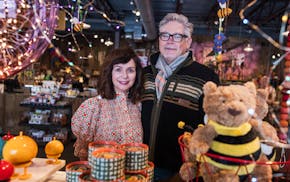It's an age-old belief: Human progress wrecks the environment.
British data scientist Hannah Ritchie dispels this notion in my favorite book so far this year, "Not the End of the World: How We Can Be the First Generation to Build a Sustainable Planet."
Ritchie makes a strong case against both the doomsayers and denialists of climate change. Like me, she believes that neither a smaller population nor less economic growth will solve the world's environmental challenges.
She and her colleagues at the Our World in Data website became popular during the pandemic. As terrific as she is explaining complex ideas with numbers, Ritchie accomplishes even more in the book, which focuses on all the big issues environmentalists care about: climate change, deforestation, biodiversity loss, food, ocean plastics.
Throughout history, there's been a trade-off between human well-being and environmental protection, she writes.
"That means one must be prioritized over the other, and for 'sustainability,' it's the environment that wins," Ritchie writes. "This trade-off existed in the past. But the central argument throughout this book is that this conflict does not have to exist in the future. There are ways to achieve both at the same time."
In my column last Sunday, arguing as I often do that Minnesota's slow growth needs to pick up some steam, I offhandedly mentioned that one of the benefits of economic growth is a clean environment.
To me that seems obvious. Greater wealth that results from growth allows a community or society to spend money on making the environment better.
Many readers focus on the other side of the equation. They worry that more growth creates more demands on the environment.
One of the first commenters on the online version of last week's column wrote, "Evan, how about addressing the environmental aspects of efforts to increase growth? The planet just won't support it."
Rod Fisher, a retired scientist and engineer in Eden Prairie, emailed to ask, "How do more people, more economic activity, more cars, more food production, and more emissions help the environment?"
After we exchanged notes, he added, "I agree with the many benefits that economic growth has brought humans. But the downsides must also be acknowledged."
I agree that the downsides of growth must be acknowledged, as long as we also acknowledge the downsides of decline.
A clean environment is lower on the hierarchy of human needs than access to water, food and shelter. And if there is less money to go around, or fewer people generating wealth, then it's going to be spent on basics. While a clean environment is needed for health, it's going to be paid for after those other priorities.
Human progress is not a straight line and the trade-off between human well-being and the environment was unbalanced for much of the 19th and 20th centuries. During the industrial revolution, big factories were built with no regard for environmental impact, for instance.
That still happens in developing countries. However, Minnesotans today enjoy one of the cleanest environments in the world. That's not just because we developed the will to regulate for a clean environment but also the ability to afford things that make it happen, such as the scrubbers and filters in factories that clean air and liquid emissions.
I was just a young child when Paul Ehrlich's "The Population Bomb" book helped to spark the environmental movement of the 1960s and 1970s. Ehrlich, a Stanford entomologist, believed that humanity had outgrown its ability to feed itself.
He completely overlooked the work of agronomists like Minnesota's Norman Borlaug, trading firms like Cargill and farmers around the world who made it possible for food to be grown in more places and in greater quantities.
As the discussion about environmentalism and sustainability progressed, the United Nations in 1987 defined sustainable development as "meeting the needs of the present without compromising the ability of future generations to meet their own needs."
In her book, Ritchie noted that definition and wrote, "The world has never been sustainable because we've never achieved both halves at the same time."
Many environmentally minded people today think we did in the past. They're overlooking how people hunted animals to near extinction and polluted the air by burning wood and crop wastes.
"Communities that achieved environmental sustainability were always small and that's because rates of child mortality were high: losing children stopped the population from growing," Ritchie wrote. "A world in which half the children die is not meeting 'the needs of the present generations' and therefore is not a sustainable one."
Ritchie believes it's possible to make sure everyone in the world can live a good life and that we reduce our environmental impacts so people in the future will too.
Her book is filled with ideas for achieving that buoyant prospect.
The first is to stop thinking it's either the planet or us.

Ramstad: Tile Shop learned its lesson in the first Trump administration
Ramstad: We have too much commercial office space. It's time to consider tearing down some towers

Ramstad: This Twin Cities bridal designer started a side hustle to cope with business ups and downs

Ramstad: Pandemic forced tough choices between health and money


